The Nigerian Airspace Management Agency (NAMA) is sounding the alarm, pleading with the Federal Government to stop slashing its revenue by 50% at source. This practice, NAMA warns, threatens the safety of air passengers by starving the agency of funds needed to modernize critical equipment.
At the 54th Annual General Meeting of the Nigerian Air Traffic Controllers Association in Abuja on October 21, 2025, NAMA’s Managing Director, Ahmed Farouk, laid bare the stakes, calling for urgent action to protect Nigeria’s skies.
The plea comes as NAMA struggles to keep aging navigation systems up to date, a task vital for safe and smooth air travel. Without change, the agency fears a crisis looms over Nigeria’s aviation sector.
Funding Woes Threaten Skies
Farouk didn’t hold back, pinpointing funding as NAMA’s biggest hurdle. “The 30% to 50% deductions from our earnings cripple us,” he said, explaining how these cuts limit upgrades to infrastructure critical for guiding planes safely.
From radar to communication systems, NAMA’s operations demand constant investment to meet global standards. Yet, half its revenue is siphoned off, leaving little for essential projects.
“Airspace safety isn’t negotiable,” Farouk stressed. “These deductions choke our ability to maintain and modernize equipment that keeps flights secure.” The urgency of his words underscores the high stakes for millions of travelers.
A Call for a Waiver
NAMA’s solution is bold: a government waiver to end the revenue deductions. Farouk called this a “game-changer” that would let NAMA pour every naira into cutting-edge technology, infrastructure, and staff training.
“Imagine the impact,” he said, envisioning a revitalized aviation sector with safer skies and smoother operations. The waiver could unlock funds to replace outdated systems and bolster Nigeria’s role as a regional aviation hub.
The agency’s appeal aligns with national priorities, as Nigeria grapples with economic challenges and infrastructure gaps. A stronger NAMA could drive growth and confidence in air travel.
Supporting the Human Edge
NAMA also vowed to prioritize its workforce, especially air traffic controllers, whom Farouk called “the guardians of our skies.” Their skill and vigilance keep Nigeria’s airspace safe, but they need better tools and support.
The agency is pushing for investments in training and welfare to ensure controllers thrive under pressure. “We’re committed to their growth,” Farouk said, signaling hope for productive talks with stakeholders to shape future collaborations.
This focus on people, alongside technology, shows NAMA’s holistic approach to tackling its challenges and strengthening aviation safety.
A Broader Context
The plea comes amid other national efforts, like economic grassroots plans and healthcare upgrades, highlighting Nigeria’s push for progress. Yet, aviation remains a critical lifeline, connecting cities and boosting trade.
NAMA’s struggle reflects broader infrastructure woes, where funding shortages hamper potential. The agency’s call for a waiver isn’t just about money it’s about securing a safer, more reliable future for air travel.
Farouk’s speech resonated with urgency, as NAMA seeks to rally government support. The outcome of this appeal could define Nigeria’s aviation landscape for years to come.
A Skyward Vision
NAMA’s fight for full revenue control is a fight for safer skies. By ending deductions, the agency could transform Nigeria’s airspace with modern equipment and skilled controllers. As Farouk’s words echo, Nigeria stands at a crossroads.
Will the government act to empower NAMA, ensuring every flight lands safely? The nation watches, hopeful for a future where aviation soars without fear.
READ MORE: Ned Nwoko Links Regina Daniels’ Behavior to Drug Issues




















